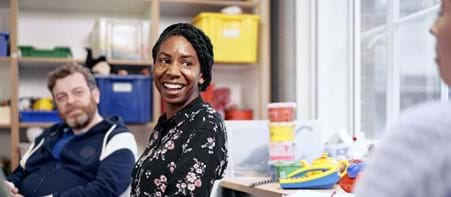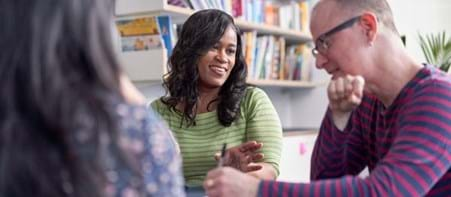1. Choose the right qualifying course for you
To practice as a counsellor for children and young people with Place2Be, you'll need to complete one of the below qualifications.
Level 4 Diploma in School-Based Child Counselling
Our Level 4 Diploma will enable you to qualify as a children and young people's counsellor in 12 months. This full-time course includes practical experience working with primary-aged children in one of our Place2Be partner schools as a Counsellor on Placement.
Learn more about our Level 4 Diploma
Postgraduate Diploma in Counselling and Psychotherapy for Children and Young People in Schools
Our Postgraduate Diploma allows you to qualify as a children and young people's counsellor in two years. The course is part-time and includes a supervised placement in one of our Place2Be partner schools as a Counsellor on Placement.
If you started your counselling training elsewhere, you can apply for our Postgraduate Diploma if you have a qualifying Level 3 Certificate, Counselling Diploma or relevant degree and have completed a Place2Be Taster Day.
Learn more about our Postgraduate Diploma
2. Complete a clinical placement as part of your training
Reputable professional bodies require you to complete a certain number of placement hours as part of your qualification in order to become a member.
Our counselling placements are an excellent opportunity to work with children and young people in a safe therapeutic setting. Both of Place2Be’s qualifying courses include a placement that is organised for you by our training and placement teams.
Find out more about Place2Be’s counselling placements in schools
3. Get accredited by a professional body
As a child counsellor, it's crucial that you meet specific safety and ethical standards. Membership organisations make sure these standards are consistently met by practicing counsellors.
In the UK, several professional bodies accredit counsellors. Options include:
- applying for accreditation through the British Association for Counselling and Psychotherapy (BACP)
- gaining accreditation from an accredited association on the UK Council for Psychotherapy (UKCP) Register
- become a member of the National Counselling Society (NCS).
4. Supervision
Both trainee and qualified child counsellors are required to have regular clinical supervision sessions with an experienced and qualified supervisor. The requirements for clinical supervision can vary depending on your accrediting body or professional organisation.
We work closely with the British Association for Counselling and Psychotherapy (BACP), who specifies that counselling trainees need:
- a minimum of 90 minutes of supervision every month
- 8 hours of counselling to one hour of supervision
- supervision every two weeks.
The BACP website has more information about supervision requirements and what to look for in a clinical supervisor.
Are you qualified to practice as a child counsellor and looking to further your counselling training? Find out more about how you can progress your career as a counsellor for children and young people on our Further your counselling training page.







